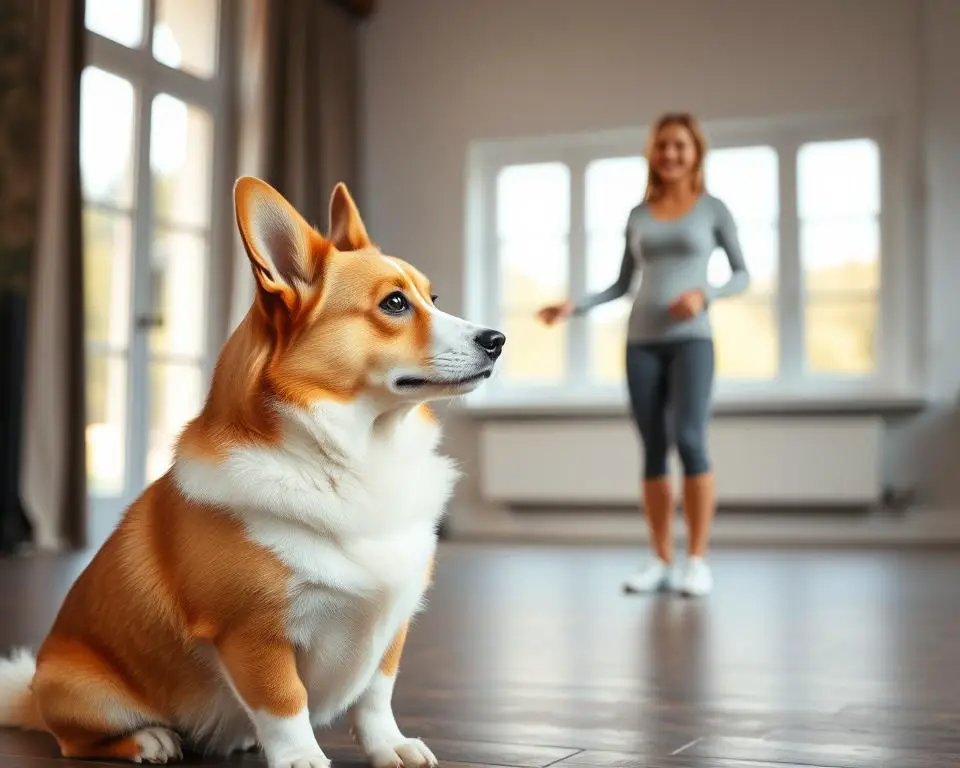A lot of my friends have corgis. They are one of the most popular dog breed breeds in the world. Even Queen Elizabeth II owns corgis!
The welsh Corgi has been around for centuries and is known for its short legs and big ears. But corgis are also known for being stubborn.
So are corgis easy to train?
Corgis are easy to train but require lots of exercise and patience. You must spend plenty of time playing with them and giving them treats. A Corgi owner should start training early since welsh corgis are known for being stubborn, independent, and loyal.
They also make excellent companions for people who enjoy outdoor sports like hunting or fishing.
But there’s a lot more to know! In this article, we’ll talk about training your Corgi. We will cover topics such as temperament, what makes them happy, and much more so that you can set the right expectations.
Let’s get started.
Corgi temperament
Corgi’s temperament can vary a lot from dog to dog. Some welsh corgis are very calm and easygoing, while others can be pretty high-strung and excitable. However, all corgis share a few common traits that can make training challenging. For example:
- They can be stubborn
- Corgis are intelligent
- Corgis have a lot of energy
- Corgis can be willful
With that said, let’s take a look at some tips on how to train your Corgi.
Training welsh corgis
You can use any positive reinforcement to help your dog learn. Rewards work well because they motivate your dog to do what you ask. The trick is finding a prize that will excite your dog about learning.
For example, you can offer your dog a treat or tug toy after he performs an obedience task correctly. Or you can let him choose between two different rewards. One option may be more appealing than the other, so he has to decide which one he wants.
Reward your dog whenever he behaves appropriately. Praise him whenever he listens, sits, walks on a leash, comes back, and stays. Be patient as you train your dog. Remember that he’s not going to respond instantly. It can take weeks before your dog starts responding to your commands.
(source)
Stick to a routine
One of the most important things to remember is consistent training with any dog, but especially a corgi is to be consistent. Welsh Corgis are very intelligent dogs and will quickly learn what you expect from them.
If you treat them well, they will respond by behaving appropriately. If you yell or hit them, they won’t learn anything. Be patient and kind. Remember that you’re teaching your dog not only how to obey but also how to respect you as an authority figure.
They are food-driven
Food is a powerful motivator. In fact, it’s one of the most effective ways to teach a puppy how to behave. If you want your dog to learn what to do, feed him treats while he does it.
This works best when there are no distractions around.
You’ll need to make sure that you keep your dog away from things like toys, balls, and other objects that could distract him. Also, please don’t give him too many treats at once. He needs to earn his reward.
Welsh Corgis are very smart. They can understand basic commands and know what you mean.
However, the training process isn’t easy. It takes lots of practice. Your dog might seem stubborn sometimes, but remember that he’s just trying to figure out what you want. Patience and consistency are key.
Don’t punish him if he doesn’t listen immediately. Instead, praise him when he obeys. When he learns something new, he repeats the command over and over again. Keep doing this until he gets it right.
Corgis with children
Some people believe that Corgies aren’t suitable for families. They think that because Corgis are high activity level dogs, they’re too much for kids. This couldn’t be further from the truth. In fact, many different factors determine whether or not a Corgi will be good for children.
Several things make welsh Corgis great pets for families.
- First off, they don’t shed as some other breeds do.
- Second, they’re very loyal animals.
- Third, they love to play.
- Strong herding instinct
These three traits help make Corgis the perfect family pet.
Corgis are stubborn
The corgi breed is known for being extremely smart, affectionate, and playful. But while there are many different types of corgis, some owners find it difficult to control their dog’s behavior.
They’re really good dogs, but they do tend to be a little bit willful.
Corgi owner
She explains that because welsh corgis are bred to work closely with humans, they often want to please people. She adds that they are usually gentle with children and other animals, but they can become aggressive towards strangers. This makes training challenging for some owners.
If you decide to adopt a corgi puppy, she recommends starting early. Puppies learn best through play and socialization, she says. You’ll also need patience.
You’ve got to understand that they don’t necessarily respond well to correction, she warns. Instead, try rewarding positive behaviors like sitting, lying down, and staying calm.
Corgi owner
Activity Level
Corgi owners know that their dog is always ready for action. These dogs are full of energy and love to run around and play. They do best in a home with plenty of room to roam and explore.
Also, they require daily exercise and mental stimulation. Because of this, they should perform outdoor activities that help them burn calories.
Corgis learn quickly
Recent studies have found that corgis learn best when they receive rewards for learning. If you train your dog using food rewards, he’ll learn faster than if you use verbal commands alone.
In addition, you can teach your dog tricks by giving him treats after each trick. For example, you can teach your Corgi to fetch a ball by rewarding him every time he brings it back to you.
(source)
Use the correct training method.
If you’re looking to train your pet, there are many different ways. Some people say that positive training is better, while others believe that negative training (yelling) is the only way to go.
However, how can you tell which method is right for you? Here are some tips that might help you decide what approach to take.
(source)
Have a Daily Routine
A daily routine will help your dog adjust to his new home. Your dog needs predictability and consistency. He needs to know what he’ll see every day and how long it will take him to get there. If you provide those things, he’ll feel safe and secure in his surroundings.
You might think your dog will just follow you around 24/7, but dogs are actually creatures of habit. They need routines. And while you don’t want to force a schedule onto them, you do want to establish some essential habits.
Start young
Puppyhood is the ideal age to start teaching your dog new skills. It’s easier to get them used to new situations at this stage.
Start small
When you first introduce a new command, give your dog only a few seconds to perform it. Then reward him immediately. Over time, increase the length of time until you finally let him go without any praise or treats.
Pick a place to start
Choose a spot where you both will enjoy spending time together. You could choose a favorite room in your house, such as the kitchen or living room. Or maybe you’ve got a backyard area that works well for your dog. Whatever you decide, make sure it’s somewhere you’re comfortable having your dog join you.
Be consistent
Keep a daily walk routine the same every day. Don’t change anything except the time. For example, if you usually walk your dog in the morning, keep doing that. But if you walk your dog in the afternoon, you’ll have to modify your routine.
Stick to the plan. Don’t deviate from your schedule unless you have a good reason. You never want to let your dog down. So if you’re running late, tell your dog ahead of time. Then, once you arrive, give him lots of praise and attention.
Use praise. Praise your dog when he learns something new. He’ll be more motivated to repeat the behavior.
Crate training
Crate training is a process of teaching your dog to be comfortable in an enclosed space, like a crate or kennel.
This can be a helpful tool for housebreaking, travel, and more. Crate training can take time and patience, but it’s important to start with baby steps and work up to longer periods. Here are some tips to get you started:
- Choose the right size crate. The crate should be just big enough for your dog to stand up, turn around, and lie down comfortably. If it’s too small, he’ll feel claustrophobic; if it’s too big, he’ll feel like he can’t get away from his business.
- Put the crate in a comfortable location. Place it in an area of the house where your dog spends a lot of time, like near his bed or in the living room.
- Introduce your dog to the crate gradually. Start by feeding him meals in the crate, then progress to putting treats or toys in the crate, and finally ask him to go into the crate on command.
- Don’t force your dog into the crate. If he’s resistant, try putting a towel over the crate to make it feel more like a den.
- Reward your dog for going into the crate. Give him a treat or praise when he goes in on his own.
With patience and positive reinforcement, you can crate-train your dog successfully. Just remember to take it slow and be consistent.
(source)
Is it difficult to train a corgi?
Corgi owners know how smart their pets are. But do you think you could teach one?
The short answer is yes. A lot of people believe that training a dog takes a long time. But, some tricks make it easier.
To start, let’s talk about what makes a good trainer. A great trainer must love animals. You don’t want someone who just wants to make money off of you. You want someone who loves animals and wants to help them become better.
Next, you’ll want to find someone who knows what he/she is doing. If you’re looking for a professional trainer, look for someone who has been trained.
If you’re looking for a hobbyist, go online. There are many resources out there. Look for videos where trainers show you precisely what they did.
Now, let’s move on to teaching your Corgi.
First, you’ll need treats. Treats aren’t always necessary, but they do help. When you give your dog a treat, ask him/her to sit. Then, tell them “sit.” Repeat this step over and over again. Eventually, your Corgi will begin to associate sitting with food.
Once your dog understands this command, try giving them another command. For example, say “come” and then “go.” Your dog should now associate coming with getting something good.
You can use this method to teach your dog almost anything. Just keep repeating the steps over and over again.
When do I need to seek professional help?
Training dogs can be a difficult task to perform on your own. If you find yourself getting frustrated, it might be time to seek out the help of a professional trainer. Not only will they be able to help you with specific training goals, but they can also give you guidance on how to manage your dog’s behavior better overall.
The right kind of owner
Dogs, like people, are individuals. And just like people, they need a confident owner to reach their full potential. If you’re thinking about getting a corgi, ask yourself if you have the time, patience, and energy to commit to training one. If not, then perhaps another breed would be a better fit for you.
Corgis need owners who are:
- Consistent
- Patient
- Willing to put in the time and effort
- Firm but fair
Corgis are very affectionate dogs. They love being near people and enjoying activities such as walking, training, and playtime; therefore, they deserve an equally loving home environment.
Which are easier to train, male or female Corgi?
On average, male corgis tend to be more stubborn than female corgis, but if you work with both males and females, you’ll find that they respond equally well to proper training.
However, each dog is an individual and will respond differently to training methods. Ultimately, it will depend on your dog’s personality and temperament.
Final thoughts
In this article, we’ve learned a lot. While corgis may be stubborn and willful, they are intelligent dogs that can learn quickly.
Be consistent, and don’t let yourself get distracted. You want to teach your dog what you do and don’t allow him to do. This includes everything from where you put his food bowl to how often you take him out. Don’t change things up too much, or you could confuse him.
Reward your dog every step of the way. When he does something right, give him praise.
By being consistent and using the proper dog training method, you can successfully train your Corgi. And if you find yourself struggling, don’t forget we’re all humans, so don’t hesitate to seek out the help of a professional trainer.
Want to learn more about corgis?
Ready to boost your knowledge about corgis to the next level? Check out the articles below:
- Are corgis aggressive? (Explained)
- Why Do Corgis Butts Float? The Scientific Explanation
- Do Corgis Bark a Lot? (Helpful Tips)





